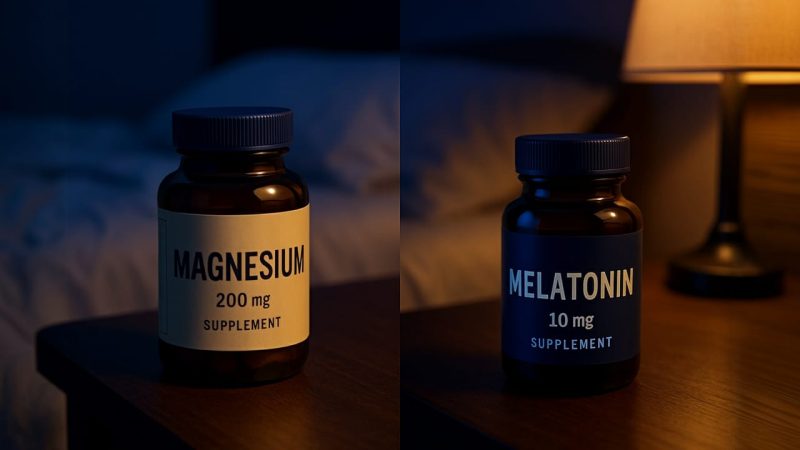Sleep issues are more common than you think. Millions of people worldwide feel sleep-deprived or report dissatisfaction with their sleep quality. The paradox is that people believe they can choose how much sleep they need. Work, stress, health issues, or entertainment can keep you up long beyond bedtime, but in the long run, you could face serious problems.
Traditional medicine systems and modern science have provided several great options to ensure that you get the right amount and quality of sleep. Among these, magnesium and melatonin supplements are popular and effective.
Why is Sleep Important?
As with any living organism, humans, too, need periods of rest where the entire system can restore and rejuvenate itself in preparation for another cycle of activity. We are equipped with a natural cycle of waking and sleeping known as the circadian rhythm. This works according to a biological clock that’s roughly set to about 24 hours and is affected by light-darkness cycles. The release of hormones and essential processes such as digestion, are regulated by this rhythm.
Sleep is the resting part of the cycle. It allows the body to save energy during resting periods, process information in the brain, repair cells, boost the immune system, and perform many routine housekeeping tasks inside the body.
Lack of sleep manifests itself physically, mentally, and emotionally. You feel lethargic, and your vision, sense of balance, and coordination are poor. You’re unable to focus, concentrate, evaluate, learn, and remember, and emotionally, you feel irritable, depressed, and lack motivation. Students who stay up late studying often find that they perform poorly on tests the next day. Other effects of sleep deprivation are weight gain, weakened immunity, high risk of stroke and cardiovascular problems, poor driving skills, and lower reaction time. In children, sleep deprivation may show up in the form of behavior problems, poor communication skill,s and lack of energy.
We often hear the term “sleep debt,” but this is in some ways a misnomer because in real terms, it’s not possible to make up for lost sleep as easily as we think.
Keeping these facts in mind, there are many ways to ensure sound sleep. Healthy eating habits, exercise, digital detox, calm environment, practices such as meditation or yoga, and a comfortable setting are all good sleep aids. To find more information and resources about health and wellness, and sleeping better, visit Rest and Digest - your one-stop shop for all self-care-related resources.
Magnesium and Melatonin: What You Need To Know
Melatonin is the body’s natural hormone that induces sleep. It is released by the pineal gland in the brain, responding to light/darkness, and synchronizes other body systems to enter a resting mode. It can help to adjust and control the circadian rhythm, especially when you’re jet-lagged after a long flight or you’ve come out of a late shift at work. As we grow older, the production of natural melatonin in the body tends to reduce, and that’s why many older people sleep less.
Magnesium is an essential mineral that your body needs to manage heart rate, digestion, immunity, blood sugar, and blood pressure levels. It is also a muscle relaxant that is usually available in our food. There are many types of magnesium supplements that you can take, such as magnesium oxide, magnesium glycinate, or magnesium threonate. These forms are easily absorbed in the body, bioavailable, or more suited to different age groups, based on the chemical composition.
You can take melatonin in the form of slow-release tablets in the dosage recommended by your physician. Magnesium supplements can be taken as tablets and also in the form of creams, sprays, or lotions for topical application.
Which One To Choose?
Both products are effective in inducing sleep. However, there are specific differences in when and how they are prescribed.
Melatonin is excellent for addressing short-term sleep issues or temporary problems such as disruption in your circadian cycle due to jet lag or overwork. Your physician will recommend that you take the appropriate dosage a few hours before bedtime, as these tablets are usually slow-release. If the problem is temporary, you may need to take tablets a few times a week for a specific period. For more chronic issues, a higher dosage may be prescribed. The advantage of melatonin is that it is non-addictive and can be safely consumed in smaller doses by older children and teens.
Magnesium helps to promote deeper and better quality sleep. It is a good muscle relaxant and most effective for people with restless leg syndrome. It reduces the action of stress hormones such as cortisol and helps you relax. It can lower blood pressure and the risk of type 2 diabetes. Some studies show that it is effective in treating migraine headaches and preventing osteoarthritis. If you are looking for magnesium oil spray made in Australia you can find it online along with other magnesium-related self-care products and resources - at Rest & Digest.
Both melatonin and magnesium are excellent for treating sleep deprivation and insomnia, regardless of the causes of these conditions. Melatonin is usually prescribed for short-term correction of the circadian cycle, while magnesium helps to relax the muscles and provide longer and deeper sleep.
It is essential to consult your doctor before taking either product to ensure you have all the necessary information about proper dosage and potential side effects.

